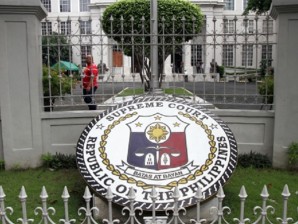MANILA, Philippines—Environmental crusader Antonio Oposa is to spearhead the planned filing on Monday of a petition asking the Supreme Court to issue a “writ of kalikasan (nature)” that would require the government to implement, devise and implement a road-sharing scheme for motorists, cyclists and pedestrians.
He said the petition has the full backing of the Department of Environment and Natural Resources, which is one of the respondents.
The petition, to be filed on behalf of the “carless people of the Philippines,” asks the government to devote half of all roads to “organized, collective, clean and affordable transportation system,” and the other half for covered sidewalks, all-weather bike lanes and urban gardens.
The objective is to reduce traffic, air pollution, and heat-trapping gases from emissions by motor vehicles, Oposa told a briefing at the Lung Center of the Philippines on Wednesday.
Oposa, a 2009 Ramon Magsaysay awardee, noted that only about 1 percent of the Philippine population own vehicles, but car owners were being given almost all the road space.
Oposa also cited existing policies, including Executive Order 774 issued in 2008, directing government agencies to reform the road system based on the principle that “those who have less in wheels must have more in roads.”
A “writ of kalikasan” is a legal remedy for parties who believe their “constitutional right to a balanced and healthful ecology is violated or threatened with a violation” and to stop environmentally destructive acts.
Its grant would lead to appropriate protection orders and mandate court hearings on environment and health matters.
Oposa said he was actually “collaborating” with the agencies his group intended to identify as respondents in the writ, among them the Department of Environment and Natural Resources, the Office of the President, the Department of Transportation and Communication, and the Department of Public Works and Highways.
He recalled that in one meeting in Bangkok, Environment Secretary Ramon Paje, upon hearing Oposa’s ideas, even instructed Environmental Management Bureau Director Juan Miguel Cuna to help “put everything the DENR wanted to do but could not accomplish” in the petition.
Cuna, who attended Wednesday’s briefing, said the DENR was a “willing and informed respondent” in the writ of kalikasan.
He said the agency was responsive and open to new ideas that might help the government enforce the Clean Air Act and other relevant environment laws.
“We are not losing hope in finding solutions for people to understand the significance of eradicating air pollution,” he said.
Cuna noted that almost 80 percent of the air pollution in Metro Manila comes from mobile sources, particularly motor vehicles.
“One way to address this, given the worsening traffic situation is to lessen the number of vehicles plying the roads. Now it’s a matter of thinking of ways how we can clearly and completely accomplish this,” he said.
Oposa said he had also talked to Metropolitan Manila Development Authority chair Francis Tolentino, who was surprisingly receptive to his ideas.
As for the budget, he proposed that the government use a portion of the part of the road users’ tax that is supposedly intended for reducing air pollution.
Oposa said he was willing to put his lawyer’s license on the line for the grant of the writ of kalikasan. “If this writ of kalikasan is not granted, I will tear my license. It is worthless anyway,” he said.
He described the writ as a “people’s movement,” representing not only people without cars but also those who have cars but have no other alternative because of the absence of an efficient mass public transport system.
Oposa said he did not mean to butt heads with government officials, but hoped to change mindsets about the inefficiency of car use in a country like the Philippines with so little urban space.
He compared politicians to clouds sailing with the wind; thus, it’s up the people “to be the wind beneath their wings,” and to move them in the right direction.
RELATED STORY
NIA abides by writ of kalikasan vs megadam
